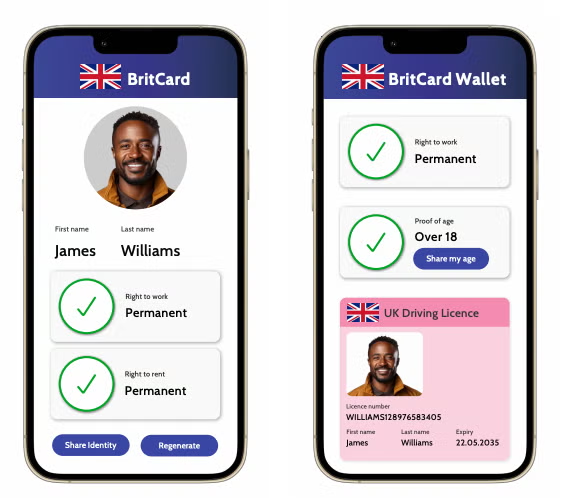Last week, UK Prime Minister Keir Starmer unveiled plans for a nationwide digital identity scheme, dubbed the “Brit card”, which he said would curb illegal working and simplify access to essential services such as banking and healthcare.
The digital ID, to be delivered via an app on residents’ smartphones, will display information including residency status, name, date of birth, and nationality.

The ‘Brit Card’ app
Under the proposed legislation, employers will no longer be able to rely on National Insurance numbers or paper-based checks to confirm an individual’s right to work.
“You will not be able to work in the United Kingdom if you do not have a digital ID. It’s as simple as that,” Starmer said.
The announcement sparked a mixed response. Civil liberties groups have raised concerns about privacy, data security and potential government overreach, and more than 1.6 million people have signed a petition opposing the scheme.
Industry leaders, while broadly welcoming the government’s backing for digital identity, warned that the design and implementation of the programme will be crucial to avoiding unintended consequences for innovation and competition.
Janine Hirt, CEO of the industry body for UK fintech, Innovate Finance, and RegTech UK, said the initiative needs clarification to ensure it supports innovation rather than stifles it.
“Government support for digital identity is welcome, but the initial announcement raises concerns about innovation that need to be addressed swiftly,” Hirt said.
She said that while digital identity helps reduce fraud and enables financial inclusion, “it is also vital that the roll-out of Digital ID supports a competitive market, underpinned by a trust framework, not via a monopoly or costly State solution.”
Hirt warned that mandating a government-issued ID could crowd out private-sector companies that have already developed accredited solutions under the existing legal framework.
She argued that the scheme’s design should enable multiple providers, fostering innovation in the country’s nascent verification technology sector.
“The mandatory Government digital identity announced today could provide a useful identity attribute which can then be used by verification providers to provide a range of services,” she added.
“If, however, it becomes the de facto identity scheme or is delivered in a way that hands market power to a few large corporates, it will kill the UK’s innovation opportunity and undermine trust.”
Others in the industry emphasised the need to manage expectations of what digital identity can achieve.
Jonathan Frost, Director of Global Advisory for EMEA at fraud detection specialist BioCatch, said: “Digital ID is not a silver bullet for illegal work, informal economies, or fraud. Just look at EU countries like France, Germany, and Belgium, which already have national ID schemes, yet still face significant challenges in these areas.”
“Its more immediate value may lie in reducing friction in financial services and state entitlements rather than directly cutting fraud. The real potential could come from linking state systems, like DWP and HMRC, with those operated by banks,” he added.
From the perspective of online safety and age verification, the proposal could mark a significant shift in how UK residents prove their identity: “Moving to a compulsory ‘Brit card’ would be a sharp turn for our digital destinies and a sea change for the way we identify ourselves in person and online,” said Andy Lulham, chief operating officer at Verifymy.
“As well as verifying adults’ right to live and work, a digital ID card – if implemented – could quickly become one of the most popular ways to prove your age.”
“Syncing government-issued ID with smartphones fits with the steady shift to mobile payments and could be quickly used for a range of purposes, especially buying alcohol.”
“With a wide range of personal data on a universal ID card, however, user adoption may be lower online, particularly for accessing age-gated platforms like social media or adult sites.”
The government is expected to set out further details on the design, implementation and governance of the Brit card in the coming months.


